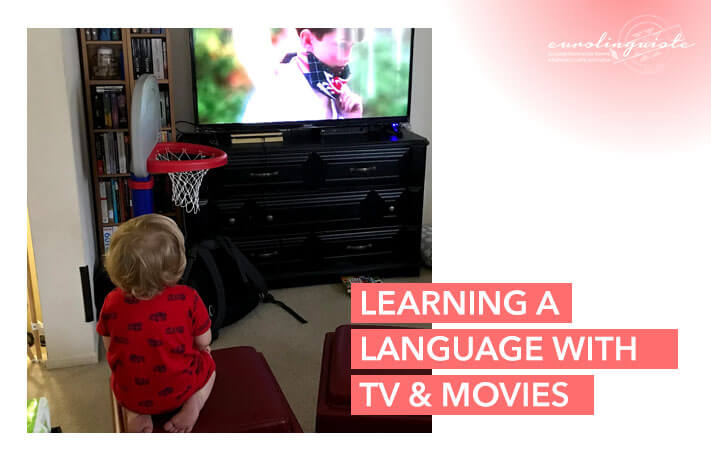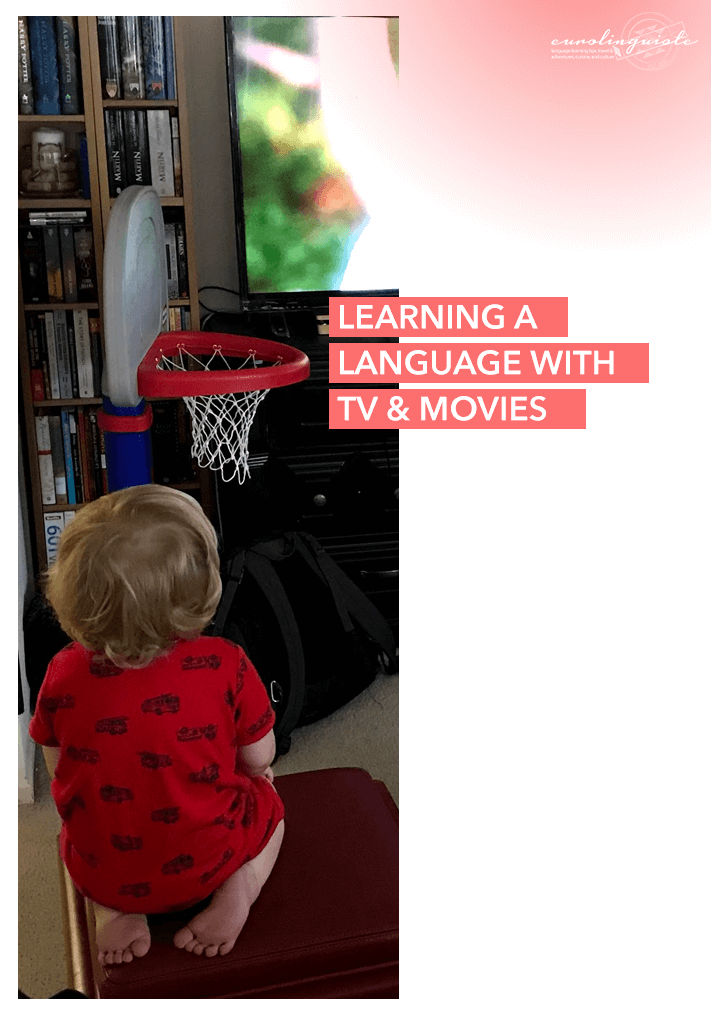Can You Learn a Language by Watching TV Shows?

My name is Shannon Kennedy and I'm the language lover,…
Do you enjoy watching tv?
If so, you may be wondering if you can turn your cinema hobby into a tool for language learning.
You may have heard the stories. The one about the Hungarian speaker who learned English watching Friends. The French speaker who grasped the English language while watching The Simpsons. Or the Korean learner who used their love of K-dramas to help them become fluent in the language.
When people first get to know me and they hear about my passion for language learning, I am often asked how I’ve managed to learn so many other languages.
And yes, tv and movies are tools I’ve used to learn them!
But it’s not as simple as pressing “play” and sitting back. Learning with dramas or films only works if you’re engaging with what you’re watching.
So why do I like movies and shows as language learning tools?
I am all about passion-driven learning techniques. And that means using my hobbies and interests to learn languages is something I regularly do. I’ve shared how I’ve used my love of food and martial arts to improve my languages, and now I’m excited to share how I use watching television and movies in foreign languages to accelerate my language learning.
Can watching foreign films help you learn another language?
First, when it comes to using film or tv to learn another language, there are two very important worth noting:
- Passive learning won’t work
- Learning with movies and tv shows will work only if they’re a part of a larger language learning strategy
Why Passive Learning Won’t Work
While I was in middle and high school, I attempted to watch foreign films and absorb the languages I was learning, but I didn’t really ever feel like I was improving.
One of the mistakes we make when setting out to use tv to learn another language, and that I was certainly making at the time, is that we sit down and expect to learn via osmosis.
If that’s the way you go about it, you may find you’re not gaining ground in the language.
Unless I was constantly pausing, rewinding, listening, and taking notes while watching tv, the only time films really worked for me was once I was already quite proficient in a language and could read the subtitles in the original language rather than my native language.
If your plan is to relax, watch tv, and not interact with what you’re watching in some way, you won’t maximize tv shows and movies as a resource.
Today, whenever I watch something in another language with the goal of learning, my finger is constantly on the remote. I pause the movie, rewind, then rewind again. I listen to the phrases and expressions used by the characters, writing down those I think might be useful to me and actively engage with whatever I’m watching.
From there, I’ll take what I’ve written down to my tutor so that she can proofread what I’ve written to make sure it’s correct. Then, as a last step, I’ll add it to my flashcards to study.
Other things you can do to make tv a more active learning experience include:
- Shadowing
- Improvising your own responses to questions asked by characters
- Memorizing lines
- Mirroring the accent and speech patterns of a character
- Learn facial expressions and gestures
- Watch the shapes the characters’ mouths take when they speak the language and try to recreate them yourself
- Taking notes
Try one of these out the next time you’re watching something on Netflix and let me know how it goes!
Foreign Films & TV as Immersion
Watching foreign-language films can be a good way a way to immerse yourself in a language when the real environment is unavailable. This is one area where I might agree, however, if one does not already have the basic tools of another language (some vocabulary and grammar), then this form of immersion won’t work.
How can you expect to absorb a language let alone understand what is happening on a screen without any entry points to the language? I would compare it to picking up a novel in a foreign language and trying to learn to speak it using that book without any previous knowledge – it’s an awfully difficult way to go. I wouldn’t say it was impossible, but I wouldn’t say it was easy either.
One might say that children learn their first language through osmosis, but I’m quite certain that many linguists would argue this isn’t the case.
Children are born with the natural ability to decipher the complex system of language by picking out repetitive sounds, eventually words and then finally phrases.¹ The total language learning process takes them a total of five years to complete with 24/7 immersion in the language and endless interaction with speakers that are trying to help them learn the language.
So the next time you feel like you aren’t learning fast enough—think again! You’re doing just fine.
So how do you use foreign movies and tv for immersion?
Again, by giving yourself a foothold. Use subtitles to your advantage. Read a wikipedia summary of the show or movie in the language first. Figure out the plot, recurring themes, and prepare by learning relevant vocabulary in advance.
How to Make Movies and TV Work for You As a Language Learning Tool
If you are looking for a shortcut to language learning – a fast way to learn a new language and skip steps, watching foreign films aren’t it. Because, spoilers: there are no shortcuts. And when it comes to visual media, you’ll have a heard time without a basic understanding of the language and entry-level vocabulary already built up. And not if you’re passively watching, not interacting with what you’re seeing or hearing.
The reason that television, if used incorrectly, is an ineffective means of language learning is because it is missing one incredibly important element – interaction. It is a form of passive rather than active learning and therefore can be seen as less effective than other means.
By watching others’ conversations in films or even by being read to by a computer, one is missing one of the most important learning elements, that of interaction. When a mother reads to her child, they discuss the book, what is happening, what might happen next and what the child thinks, allowing them to become involved with the story and use the language they are developing.
One could argue, however, that if one is actively engaged with the movie or television program, it could be considered active learning. Instead of merely watching the film, one could repeat expressions or mimic dialogue, and thus, make the activity interactive rather than passive.
And if you’re looking for more tips on how to use tv and movies to learn a language effectively, then I invite you to join my friend Caitlin Sacasas and I in Language Conqueror!
And if you’d like to take learning with food further, you can join us this month in Language Conqueror.
Caitlin is hosting this month and it’s all about learning with dramas. You get:
- A video lesson introducing the Quest
- Daily prompts to guide you along the Quest each day
- A workbook with all the exercises and instructions you need to complete the Quest
- A video demonstrating the Quest in action from one of our hosts (or special guests)
- Trade secrets from Shannon and Caitlin: these are tricks you can use to succeed at your Quest
- A Side-Quest: an action you can take to help you gain the confidence you need to complete your Quest
- Access to the Quest community so you can collaborate with other learners, share what you’re working on, and get support
- Your Quest: the final assignment you complete to put everything you learned over the month into practice
We hope to see you in this month’s Quest!

1. Countless studies have been conducted on the brain activity of infants when hearing different sounds and as early as only a few months it has been demonstrated that they are capable of discerning meaningful sounds as “their” language.

What's Your Reaction?
My name is Shannon Kennedy and I'm the language lover, traveler, and foodie behind Eurolinguiste. I'm also the Resident Polyglot at Drops and the Head Coach of the Fluent in 3 Months Challenge.









